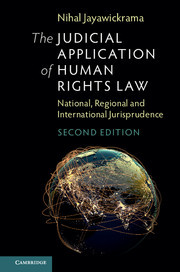The Judicial Application of Human Rights Law (2nd Ed.) National, Regional and International Jurisprudence
Langue : Anglais
Auteur : Jayawickrama Nihal

This book explores the jurisprudence from international, regional and national sources on the interpretation and application of human rights concepts.
Since the proclamation of the Universal Declaration of Human Rights, over 165 countries have incorporated human rights standards into their legal systems: the resulting jurisprudence from diverse cultural traditions creates new dimensions to concepts first articulated in 1948. In this revised second edition, Nihal Jayawickrama draws on extensive sources to encapsulate the judicial interpretation of human rights law in one comprehensive volume. Jayawickrama covers the case law of the superior courts of 103 countries in America, Europe, Africa, Asia, the Caribbean and the Pacific, as well as jurisprudence of human rights monitoring bodies. He analyses the judicial application of human rights law to demonstrate empirically the universality of contemporary human rights norms. This definitive volume is essential for legal practitioners, and government and non-governmental officials, as well as academics and students of both constitutional law and the international law of human rights.
Preface to the second edition; Preface; Table of cases; Part I. Introduction: 1. Historical and juridical background; 2. The international bill of human rights; 3. The domestic protection of human rights; 4. The right to a remedy; Part II. General Principles: 5. Interpretation; 6. Non-discrimination; 7. Limitations; 8. Derogation; Part III. The Substantive Rights: 9. The right of self-determination; 10. The right to life; 11. The right to freedom from torture; 12. The right to freedom from slavery; 13. The right to liberty; 14. The rights of prisoners; 15. The right to freedom of movement; 16. The right to a fair trial; 17. The rights of accused persons; 18. The right to recognition as a person; 19. The right to privacy; 20. The right to freedom of thought; 21. The right to freedom of expression; 22. The right to freedom of assembly; 23. The right to freedom of association; 24. The right to family life; 25. The rights of the child; 26. The right to participate in public life; 27. The right to equality; 28. The rights of minorities; 29. The rights relating to work; 30. The rights relating to social security; 31. The right to an adequate standard of living; 32. The right to health; 33. The right to education; 34. The right to cultural life; 35. The right to property.
Nihal Jayawickrama was the Ariel F. Sallows Professor of Human Rights at the University of Saskatchewan, Canada, and Associate Professor of Law at the University of Hong Kong, where he taught both constitutional law and the international law of human rights. He was also Chair of JUSTICE: the Hong Kong Section of the International Commission of Jurists, Executive Director of Transparency International Berlin, Chair of the Trustees of the Commonwealth Human Rights Initiative, London, and a Member of the Permanent Court of Arbitration at The Hague. A member of the Sri Lanka Bar, he held the offices of Attorney General and Permanent Secretary to the Ministry of Justice. He is the Coordinator of the UN sponsored Judicial Integrity Group.
Date de parution : 07-2017
Ouvrage de 1282 p.
18.3x23.5 cm
Disponible chez l'éditeur (délai d'approvisionnement : 14 jours).
Prix indicatif 222,28 €
Ajouter au panierThème de The Judicial Application of Human Rights Law :
© 2024 LAVOISIER S.A.S.



